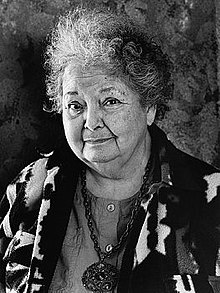Paula Gunn Allen
| Paula Gunn Allen | |
|---|---|

Paula Gunn Allen (2007)
|
|
| Born | Paula Marie Francis October 24, 1939 Albuquerque, New Mexico |
| Died | May 29, 2008 (aged 68) |
| Occupation | Poet, novelist |
| Nationality | Laguna Pueblo |
| Alma mater | University of Oregon, University of New Mexico |
| Literary movement | Native American Renaissance |
Paula Gunn Allen (October 24, 1939 – May 29, 2008) was a Native American poet, literary critic, [ ] activist,professor, and novelist. Of mixed-race European-American, Native American, and Arab-American descent, she identified with the Laguna Pueblo of her childhood years, the culture in which she had grown up. She drew from its oral traditions for her fiction and poetry, and also wrote numerous essays on its themes. She edited four collections of Native American traditional stories and contemporary works, and wrote two biographies of Native American women.
In addition to her literary work, in 1986 she published a major study on the role of women in American Indian traditions, arguing that Europeans had de-emphasized the role of women in their accounts of native life because of their own patriarchal societies. It stimulated other scholarly work by feminist and Native American writers.
Born Paula Marie Francis in Albuquerque, New Mexico Allen grew up in Cubero, New Mexico, a Spanish-Mexican land grant village bordering the Laguna Pueblo reservation. Of mixed Laguna, Sioux, Scottish, and Lebanese-American descent, Allen always identified most closely with the Laguna, among whom she spent her childhood and upbringing.
Her father, E. Lee Francis, owned a local store, the Cubero Trading Company, and later served as the lieutenant governor of New Mexico from 1967 to 1970. Her brother, Lee Francis, was a Laguna Pueblo-Anishinaabe poet, storyteller and educator.
Allen received a BA and MFA in creative writing from the University of Oregon. She earned a PhD at the University of New Mexico, where she worked as a professor and began research on tribal religions. As a student at the University of New Mexico, she reached out to a poetry professor, Robert Creeley, for poetic advice. He directed her to the work of Charles Olson, Allen Ginsberg, and Denise Levertov, who all had strong influences on her work. Later, while a student at University of Oregon she had Ralph Salisbury as a poetry professor, who is of a Cherokee tribe, and also had a heavy influence on Paula Gunn Allen.
...
Wikipedia
